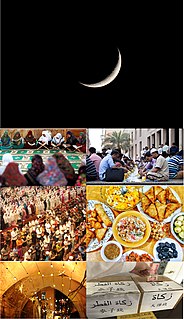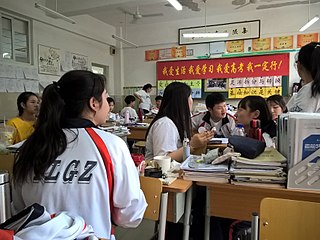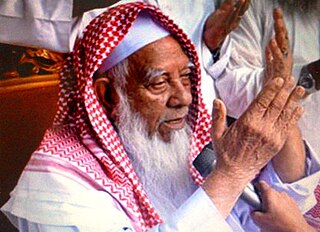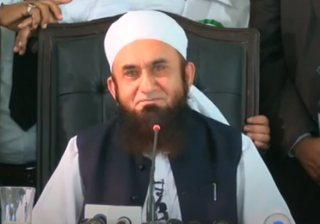
Ramadan is the ninth month of the Islamic calendar, observed by Muslims worldwide as a month of fasting (sawm), prayer, reflection and community. A commemoration of Muhammad's first revelation, the annual observance of Ramadan is regarded as one of the Five Pillars of Islam and lasts twenty-nine to thirty days, from one sighting of the crescent moon to the next.

Madrasa is the Arabic word for any type of educational institution, secular or religious, whether for elementary instruction or higher learning. The word is variously transliterated Madrasah arifah, medresa, madrassa, madraza, medrese, etc. In countries outside the Arab world, the word usually refers to a specific type of religious school or college for the study of the religion of Islam, though this may not be the only subject studied.
Islamic studies refers to the academic study of Islam, and generally to academic multidisciplinary "studies" programs—programs similar to others that focus on the history, texts and theologies of other religious traditions, such as Eastern Christian Studies or Jewish Studies but also fields such as —where scholars from diverse disciplines participate and exchange ideas pertaining to the particular field of study.

Jamia Markaz is an Islamic University running under the Markazu Saqafathi Sunniyya at Kozhikode in Kerala, India. The Markaz is located east of Kozhikode city. The foundation stone was laid by the Saudi Arabian Islamic scholar Muhammad Alawi al-Maliki in presence of Kanniyath Ahmed Musliyar and E. K. Aboobacker Musliyar.

The Allama Iqbal Open University (AIOU) is a public university in Islamabad, Pakistan. The university is the world's second largest institution of higher learning, with an annual enrollment of 1,121,038 students, the majority are women and course enrollment of 3,305,948 (2011). The university has 44 regional campuses and centers throughout Pakistan including in Faisalabad Millat Road, Multan, Dera Ghazi Khan, Dera Ismail Khan,Bahawalpur and Rahim Yar Khan.
Education in Iran is centralized and divided into K-12 education plus higher education. Elementary and secondary education is supervised by the Ministry of Education and higher education is under supervision of Ministry of Science, research and Technology and Ministry of Health and Medical Education. As of 2016, 86% of the Iranian adult population are literate. This rate increases to 97% among young adults without any gender discrepancy. By 2007, Iran had a student to workforce population ratio of 10.2%, standing among the countries with highest ratio in the world.

In Islam, marriage is a legal contract between two people. Both the groom and the bride are to consent to the marriage of their own free wills. A formal, binding contract – verbal or on paper – is considered integral to a religiously valid Islamic marriage, and outlines the rights and responsibilities of the groom and bride. Divorce in Islam can take a variety of forms, some executed by a husband personally and some executed by a religious court on behalf of a plaintiff wife who is successful in her legal divorce petition for valid cause.

Maulana Azad National Urdu University is a Central University located in the city of Hyderabad in the Indian state of Telangana. It was named after Maulana Abul Kalam Azad, India's first Minister of Education, a freedom fighter in India's struggle for independence, and a scholar of Islam and Urdu literature. It was the only Urdu university in India until the second university was built in the city of Kurnool, Andhra Pradesh in 2015.
Anti-Hindu sentiment, also known as Hinduphobia, is a negative perception, sentiment or actions against the practitioners of Hinduism.

In Islamic legal terminology, bāligh or mukallāf or muhallāq or murāhiq or muhtalim refers to someone who has reached maturity or puberty, and has full responsibility under Islamic law.
The topic of Islam and children includes the rights of children in Islam, the duties of children towards their parents, and the rights of parents over their children, both biological and foster children. Also discussed are some of the differences regarding rights with respect to different schools of thought.

The history of education in China began with the birth of the Chinese civilization. Nobles often set up educational establishments for their offspring. Establishment of the imperial examinations was instrumental in the transition from an aristocratic to a meritocratic government. Education was also seen as a symbol of power; the educated often earned significantly greater incomes.

Kanthapuram A. P. Aboobacker Musliyar known as Sheikh Abubakr Ahmad is the Grand Mufti of India and also the Social Worker. He is also the Chancellor of the Jamia Markaz, Chairman of the Siraj Daily and General Secretary of the All India Sunni Jamiyyathul Ulama,.
Classical education may refer to:

Prince Ghazi bin Muhammad is a Jordanian prince and a professor of philosophy. He is the son of Prince Muhammad bin Talal of Jordan and his first wife, Princess Firyal. He is a grandson of King Talal of Jordan and thus a first cousin of King Abdullah II and seventeenth in the line of succession to the Jordanian throne. He is well known for his religious initiatives, about which a book was published in 2013.

The Islamic Education Institute of Texas (IEIT), also known as Darul Arqam Islamic School District (DAISD) and Darul Arqam Schools is a network of Islamic schools in Greater Houston, Texas, United States. The organization is a subsidiary of the Islamic Society of Greater Houston (ISGH). IEIT is headquartered in Southwest Management District in Houston.

Shah Ahmad Shafi was a Bangladeshi Sunni Islamic scholar, the chief of Hefazat-e-Islam Bangladesh, Rector of Al-Jamiatul Ahlia Darul Ulum Moinul Islam Hathazari and also the chairman of Bangladesh Qawmi Madrasah Education Board. He was born in 1916 in Rangunia, Chittagong and was educated at Hathazari Madrasah and Darul Uloom Deoband.

Tariq Jamil, is a Pakistani Islamic television preacher, religious writer, scholar, and a member of the Tablighi Jamaat. The recipient of the Pride of Performance award, Jameel has been named twice in The 500 Most Influential Muslims.
Education has played a central role in Islam since the beginnings of the religion, owing in part to the centrality of scripture and its study in the Islamic tradition. Before the modern era, education would begin at a young age with study of Arabic and the Quran. For the first few centuries of Islam, educational settings were entirely informal, but beginning in the 11th and 12th centuries, the ruling elites began to establish institutions of higher religious learning known as madrasas in an effort to secure support and cooperation of the ulema. Madrasas soon multiplied throughout the Islamic world, which helped to spread Islamic learning beyond urban centers and to unite diverse Islamic communities in a shared cultural project. Madrasas were devoted principally to study of Islamic law, but they also offered other subjects such as theology, medicine, and mathematics. Muslims historically distinguished disciplines inherited from pre-Islamic civilizations, such as philosophy and medicine, which they called "sciences of the ancients" or "rational sciences", from Islamic religious sciences. Sciences of the former type flourished for several centuries, and their transmission formed part of the educational framework in classical and medieval Islam. In some cases, they were supported by institutions such as the House of Wisdom in Baghdad, but more often they were transmitted informally from teacher to student.
Education in Brunei is provided or regulated by the Government of Brunei through the Ministry of Education and the Ministry of Religious Affairs. The former manages most of the government and private schools in the country where as the latter specifically administers government schools which provide the ugama or Islamic religious education.











